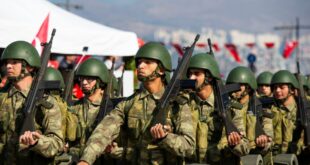Against the backdrop of continued protests, two recent events in Algeria — the election of Abdelmajid Tebboune as President of Algeria on December 12 and the death of the Military Chief of Staff and Secretary General of Defense Ahmed Qaid Saleh on December 23 — are closely intertwined. This paper will examine these two developments and their impact on the future of the Algerian political scene.
/cdn.vox-cdn.com/uploads/chorus_image/image/63184349/GettyImages_1128754462.0.jpg)
Developments in Algeria
Abdelmajid Tebboune won a majority of 58.15% in the December 12 presidential elections, in which some 40% of the electorate participated. It is clear that this result is, at heart, the work of the military establishment, which controlled the election process through its complex tactical and administrative machinery. Although the situation seemed to favor former head of government Ali Benflis, the military establishment were not reassured by their negotiations with him. Instead, they chose to shift power to an administrative technocrat with whom they were familiar, whose fundamental experience was in regional government within Algeria, thereby placing him, in practice, under the tutelage of the powerful military leaders in control of Algerian politics.
General Qaid Saleh’s plan was to circumvent the constitutional void that had driven President Bouteflika from power in April 2019 by electing a new president who would ensure the regime’s continued legitimacy and who would be capable of negotiating with protesters with a view to carrying out as many of the requested political reforms that could be tolerated by the military leadership, while still securing its traditional role at the heart of political decision-making. Qaid Saleh’s sudden death has changed the dynamic, however. It is difficult to predict what impact it will have on the following elements: the composition of the military establishment; the practical opportunities available to the new President regarding his relationship with the military establishment; and the possibilities for dealing with the ongoing protest movement.
- President Tebboune has appointed General Said Chengriha, head of ground forces since 2017, as Military Chief of Staff. Although the appointment was understandable from a technical managerial perspective, given Chengriha’s military and management experience and his closeness to Qaid Saleh, it also has several other important implications, including:
- Chengriha is the first military leader not to have served as part of the Algerian resistance, i.e. the National Liberation Army, which became the core of the Algerian army following independence. Chengriha is a respected and highly efficient military figure. He studied in the Russian Federation and gained most of his experience in the field. He assumed command of the third military division in southern Algeria (Bechar), and was entrusted with issues concerning the Moroccan border and the Sahara. It is during this time that the prevailing image of Chengriha as anti-Morocco and a supporter of the POLISARIO Front was born.
- While the political position of the new Military Chief of Staff is not well known, he is expected to oppose military involvement in internal political issues. Nonetheless, it is certain that he will continue to be governed by the overriding rules regulating governance in Algeria, which accord the military a certain fundamental role.
- The composition of the current military establishment is the result of organizational measures taken by the former Military Chief of Staff, Qaid Saleh. He assumed the role in 2004 following the removal of General Muhammad al-Ammari, who had led the military establishment since 1992 and had played a key role in political events. Since the early 1990s, Qaid Saleh had been removing dominant officers from positions of political power, most prominently General Mohamed “Toufik” Mediène, who was removed from his role as head of the Department of Intelligence and Security in 2015. Several important leaders of military regions and divisions were also removed from office following the cocaine scandal in June 2018, and a number of military leaders were prosecuted on charges of corruption once Bouteflika was removed from power. Chengriha is not expected to have the power and decisiveness of his predecessor, which poses the biggest challenge to controlling the ongoing conflict between the centers of power within the military establishment, which could escalate at any moment.
- As regards the new President’s relationship with the military establishment, it is worth noting that Tebboune’s rise to power was part of an agreement reached with the military leadership, in which Qaid Saleh was expected to become a key partner of the government, if not in charge of political decision-making. Qaid Saleh’s removal from the political scene may clear the way for President Tebboune to consolidate his power and reduce the political role played by the military establishment. Indicators of this include the fact that President Tebboune continues to hold the position of Minister of Defense and has not appointed the new Military Chief of Staff as his deputy minister, a position held by Chengriha’s predecessor. It is well known that both President Bouteflika and his predecessor Zeroual held on to the position of Minister of Defense in order to prevent the military from governing military affairs, as occurred during the final term of President Chadli Bendjedid’s reign, following the appointment of General Khaled Nezzar as Minister of Defense in 1990.
- The popular uprising that began in February 2019 continues to rage, and protesters have vocally rejected the results of the recent presidential elections, which will have an impact on the options available to the new military and political leadership for dealing with the protest movement. Nonetheless, the death of Qaid Saleh could provide a new opportunity for dialogue between political and civil leaders, particularly given that President Tebboune has expressed his desire to carry out the political and constitutional reforms demanded by protesters. In addition, Chengriha is not one of the military figures whose removal was demanded by the protest movement, which may also help efforts to achieve a solution to the current political crisis.
Possible scenarios for the Algerian political scene
Based on the above, there are three main possible scenarios:
- It is most likely that the political leadership will seek appeasement and compromise, given the recent changes on the military and civilian fronts. This is all the more likely to be the case if the President sets forth proposals for constitutional and political reform that largely fulfil protesters’ demands or if he succeeds in rooting out administrative and financial corruption as he promised during his election campaign to do. The fact that the military’s political role is likely to be reduced during Chengriha’s term of office will also contribute towards resolving the current crisis.
- Conversely, if Tebboune is unable to carry out the desired reforms and if the military stands in the path of change, the crisis may persist and protests may continue at the current pace.
- If the internal conflicts within the military establishment escalate beyond all control, or if certain military security figures manage to reestablish themselves as part of the new political scene, the situation may become explosive. Although this is the least likely scenario, it will become more likely if the protests escalate or become violent, which would pave the way for civil strife and armed conflict.
 Geostrategic Media Political Commentary, Analysis, Security, Defense
Geostrategic Media Political Commentary, Analysis, Security, Defense





